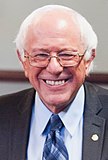2016 Democratic Party presidential primaries
The 2016 Democratic Party presidential primaries and caucuses took place in the United States.[2] It takes place before to the 2016 general election to elect the Democratic Party's nominee for the Presidency of the United States.[3] They were held between February 1 and June 14. President and 2012 nominee, Barack Obama could not stand for re-election due to term limits under the Twenty-second Amendment.
| ||||||||||||||||||||||
4,763 delegate votes to the Democratic National Convention 2,382 delegate votes needed to win | ||||||||||||||||||||||
|---|---|---|---|---|---|---|---|---|---|---|---|---|---|---|---|---|---|---|---|---|---|---|
| ||||||||||||||||||||||
 First place by initial pledged delegate allocation
| ||||||||||||||||||||||
| ||||||||||||||||||||||
Candidates
changeHillary Clinton, then Secretary of State, decided to run for president in April 2015.[4] Clinton had served as a U.S. Senator (2001–09) and was the First Lady of the U.S. (1993–2001).[5][6] A January 2013 Washington Post–ABC News poll showed that she had high popularity among the American public.[7][8] This polling data made many political critics and observers to anticipate that Clinton would launch a second presidential bid in 2016, entering the race as the early front-runner for the Democratic nomination.
On May 26, 2015, Independent U.S. Senator Bernie Sanders officially announced his run as a presidential candidate for the Democratic nomination, after an informal announcement in April that year, and speculation since early 2014.[9][10][11] Sanders had served as Mayor of Burlington, Vermont (1981–1989), as Vermont's sole U.S. Representative (1991–2007), and as Vermont's junior Senator (2007–present).[12] Bernie Sanders is currently seen as the biggest rival to Hillary Clinton, backed up by a strong grassroots campaign and social media following.[13] His campaign picked up attention and mass support. However, in recent poll numbers, Clinton is leading Saunders nationally by 12.7 percent.[14]
In May 2015, Maryland governor Martin O'Malley announced his campaign. He withdrew after the Iowa primaries. Rhode Island governor Lincoln Chafee announced his campaign in June 2015. After poor polling numbers, he dropped out before the primaries in October 2015. Former Virginia senator Jim Webb announced his campaign in the summer of 2015. He dropped out in October 2015 after a poor debate performance. Professor Lawrence Lessig announced his campaign in September 2015. He dropped out a month later after poor polling numbers.
Superdelegates
changeSuperdelegates are elected officials and members of the Democratic National Committee who will vote at the Democratic National Convention for their favorite candidate. Also known as "unpledged delegates," they may change their candidate at any time and talk about one sixth of the delegates to the convention. The table and list below show the current support.
| Distinguished party leaders | Governors | Senators | Representatives | DNC members | Totals | |
|---|---|---|---|---|---|---|
| Hillary Clinton | 10 | 16 | 39 | 166 | 247 | 478 |
| Bernie Sanders | 1 | 0 | 2 | 8 | 29 | 40 |
| Martin O'Malley | 0 | 0 | 0 | 0 | 1 | 1 |
| No endorsement | 9 | 5 | 6 | 19 | 157 | 196 |
| Totals | 20 | 21 | 47 | 193 | 434 | 715 |
Note: Democrats Abroad Superdelegates are assigned half-votes; each of them accounts for ½ rather than 1 in the table above.
Results
changeRelated pages
changeReferences
change- ↑ 1.0 1.1 Berg-Andersson, Richard E. "Democratic Convention". The Green Papers. Retrieved June 13, 2016.
- ↑ "Primary and Delegates for Democrats Abroad". Retrieved April 13, 2015.
- ↑ Cillizza, Chris (February 13, 2013). "Hillary and the rest: The Fix's ranking of the 2016 Democratic primary field". The Washington Post. Retrieved January 11, 2014.
- ↑ York, Paul Lewis Jon Swaine in New (2015-04-12). "Hillary Clinton: I'm running for president". The Guardian. ISSN 0261-3077. Retrieved 2019-11-22.
- ↑ Cohen, Jon (December 5, 2012). "Run Hillary Run!: Majority want a Clinton 2016 candidacy". The Washington Post. Retrieved March 7, 2015.
- ↑ Steinhauser, Paul (December 10, 2012). "Clinton rides high poll numbers into private life (for now?)". CNN.com. Archived from the original on April 21, 2021. Retrieved March 7, 2015.
- ↑ Cohen, Jon; Blake, Aaron (January 23, 2013). "Hillary Clinton reaches new heights of political popularity". The Washington Post. Retrieved March 7, 2015.
{{cite web}}: CS1 maint: multiple names: authors list (link) - ↑ Marlantes, Liz (December 10, 2012). "Are Republicans really 'incapable' of beating Hillary Clinton in 2016?". The Christian Science Monitor. Retrieved March 7, 2015.
- ↑ "Bernie Sanders formally launches run for president with attack on 'grotesque' level of inequality". Retrieved June 5, 2015.
- ↑ "Bernie Sanders, Long-Serving Independent, Enters Presidential Race as a Democrat". The New York Times. 1 May 2015.
- ↑ "Senator Bernie Sanders May Run in 2016 -- NYMag". Daily Intelligencer.
- ↑ "The Socialist Senator". The New York Times. 21 January 2007.
- ↑ "Challenging Hillary Clinton, Bernie Sanders Gains Momentum in Iowa". Retrieved June 5, 2015.
- ↑ "2016 National Democratic Primary". The Huffington Post. Archived from the original on 2015-10-01. Retrieved 2016-02-27.
Other websites
change- Democratic Convention Watch
- Green papers for 2016 primaries, caucuses, and conventions
- Full Transcript: Democratic Presidential Debate October 14, 2015
Cite error: There are <ref group=lower-alpha> tags or {{efn}} templates on this page, but the references will not show without a {{reflist|group=lower-alpha}} template or {{notelist}} template (see the help page).

